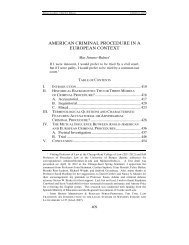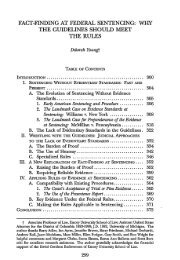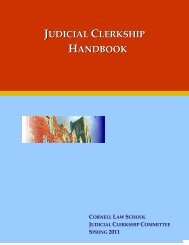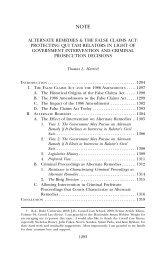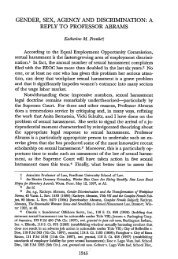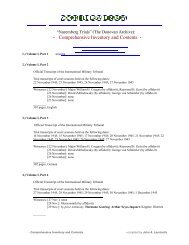JUNE 24 – JULY 30, 2013 - Cornell University Law School
JUNE 24 – JULY 30, 2013 - Cornell University Law School
JUNE 24 – JULY 30, 2013 - Cornell University Law School
Create successful ePaper yourself
Turn your PDF publications into a flip-book with our unique Google optimized e-Paper software.
procedure, administrative law and constitutional law, the course will examine the<br />
effectiveness of assorted comparative methodologies.<br />
International Commercial Arbitration (6181) (2 credits)<br />
CORNELL PROFESSOR: J. BARCELÓ<br />
A study of arbitration as the dominant dispute resolution process for international<br />
trade and business disputes, the course addresses each of the principal stages of the<br />
arbitration process: (1) enforcing the agreement to arbitrate; (2) selecting arbitrators;<br />
(3) arbitral proceedings; (4) court enforcement of arbitral awards.The course studies international<br />
commercial arbitration as a transnational system, drawing on legislation,<br />
cases, arbitral awards, institutional rules, and treaties from all parts of the<br />
world. It stresses the two principal legal instruments unifying this field on a world<br />
scale: (1) the U.N. Convention on the Recognition and Enforcement of Foreign<br />
Arbitral Awards and (2) the U.N. Commission on International Trade <strong>Law</strong><br />
(UNCITRAL) Model <strong>Law</strong> on International Commercial Arbitration. The course<br />
also emphasizes arbitration under the rules of the International Chamber of<br />
Commerce (ICC), which is headquartered in Paris, one of the world’s leading<br />
centers of international arbitration.<br />
International Human Rights (6183) (1 credit)<br />
CORNELL PROFESSOR: M. NDULO<br />
This course examines the development and effectiveness of international law<br />
governing a state’s treatment of individuals within its jurisdiction. Topics include<br />
political and civil rights, economic, social, and cultural rights, minority rights, and international<br />
criminal law. The course will also examine different mechanisms for implementing human rights,<br />
including the UN system, treaty bodies, regional<br />
institutions, and national courts.<br />
Topics in International Intellectually Property <strong>Law</strong> (6183) (1 credit)<br />
CORNELL PROFESSOR: O. LIIVAK<br />
This course will provide an overview of the main bodies of intellectual property<br />
law with an emphasis on differences among various countries. Intellectual property<br />
can be a critically important asset to protecting and enabling a business while it<br />
can just as easily be an insurmountable liability for others. Leveraging the benefits<br />
while avoiding the pitfalls requires an understanding of the structure of each area<br />
of law. This course will give an overview of that landscape by exploring some current<br />
controversies in intellectual property with an emphasis on differing approaches<br />
among various legal systems.<br />
Introduction to the American Legal System (6185)<br />
(2 credits; non-J.D. students only)<br />
CORNELL PROFESSOR: F. ROSSI<br />
This course surveys the American legal system, with emphasis on civil litigation<br />
and the court system of the United States, including: distinctive features of the<br />
American legal system; the anatomy of a civil action; the role of lawyers and<br />
judges in the adversary system; the structure of the American Constitution; the<br />
doctrine of judicial review; jurisdiction; pretrial discovery; the jury trial and<br />
judgments; and exposure to basic principles of American tort, contract, administrative,<br />
and criminal law.<br />
6



